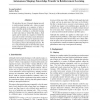Free Online Productivity Tools
i2Speak
i2Symbol
i2OCR
iTex2Img
iWeb2Print
iWeb2Shot
i2Type
iPdf2Split
iPdf2Merge
i2Bopomofo
i2Arabic
i2Style
i2Image
i2PDF
iLatex2Rtf
Sci2ools
109
click to vote
ICML
2006
IEEE
2006
IEEE
Autonomous shaping: knowledge transfer in reinforcement learning
We introduce the use of learned shaping rewards in reinforcement learning tasks, where an agent uses prior experience on a sequence of tasks to learn a portable predictor that estimates intermediate rewards, resulting in accelerated learning in later tasks that are related but distinct. Such agents can be trained on a sequence of relatively easy tasks in order to develop a more informative measure of reward that can be transferred to improve performance on more difficult tasks without requiring a hand coded shaping function. We use a rod positioning task to show that this significantly improves performance even after a very brief training period.
Related Content
| Added | 17 Nov 2009 |
| Updated | 17 Nov 2009 |
| Type | Conference |
| Year | 2006 |
| Where | ICML |
| Authors | George Konidaris, Andrew G. Barto |
Comments (0)

